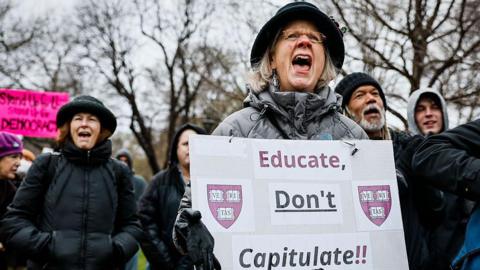The sweeping changes demanded by the White House would have transformed its operations and ceded a large amount of control to the government.
Its letter to Harvard on Friday, obtained by the New York Times, said the university had failed to live up to the "intellectual and civil rights conditions" that justify federal investment.
The letter included 10 categories for proposed changes, including:
President Trump has accused leading universities of failing to protect Jewish students when college campuses around the country were roiled by protests against the war in Gaza and US support for Israel last year.
The letter orders the university to take disciplinary action for "violations" that happened during protests.
In explaining its rejection of these demands, Harvard President Alan Garber said the university will not surrender its independence or relinquish its constitutional rights under the First Amendment protecting free speech.
"Although some of the demands outlined by the government are aimed at combating antisemitism, the majority represent direct governmental regulation of the 'intellectual conditions' at Harvard," he said.
Shortly after his letter of resistance was sent, the education department said it was freezing $2.2bn in grants and $60m in contracts to Harvard immediately.
"Harvard's statement today reinforces the troubling entitlement mindset that is endemic in our nation's most prestigious universities and colleges," the Department of Education said in a statement.
The disruption of learning plaguing campuses is unacceptable and the harassment of Jewish students intolerable, the statement said.
